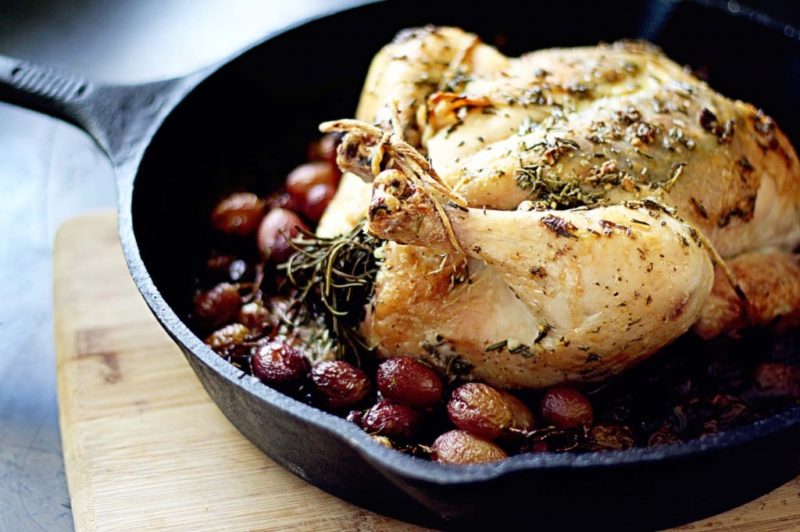Can a young mother eat grapes while breastfeeding?
During breastfeeding, it is very important for mothers to follow a proper diet, consisting of foods that do not cause colic and allergic reactions in the baby. But at the same time, nutritionists recommend a balanced diet rich in plant foods. In this article we will tell you whether a nursing mother can eat grapes and in what quantity.
Is it possible to eat grapes with breastfeeding?
Experts do not prohibit eating grapes while breastfeeding, but only in limited quantities and in cases where the baby is not allergic to this product. Then the grapes will only bring benefit mother and child, will enrich the composition of milk, diversify the diet during the diet and have a positive effect on the body. The berries are a good alternative to confectionery and candies due to their sweet taste. Fructose does not have as strong an effect on your figure as refined sugars.

Composition, properties
Grapes belong to high-calorie berries. 100 g of product contains from 60 to 72 kcal. The high energy value is due to the fact that the berries contain a lot of sugars.
Grapes are also rich in vitamins and minerals. It has a general strengthening effect and a positive effect on various body systems. This is due to the presence of the following substances:
- Silicon. Required for collagen synthesis, as well as for the health of muscle and bone tissue.
- Cobalt.Participates in the synthesis of vitamin B12, the process of hematopoiesis, and fat metabolism.
- Copper. Together with vitamin C and zinc, it forms elastin. It is a skin protein that is involved in wound healing and is also required for the beauty of hair and skin. Copper helps remove free radicals from the body and normalizes blood pressure.
- Yoda. Helps with the functioning of the thyroid gland, supports the functioning of the endocrine system.
- Vitamin C. Strengthens the immune system, helps remove cholesterol from the body, is required for the synthesis of many enzymes and normal absorption of iron.
- Potassium. It has a positive effect on the functioning of the cardiovascular and nervous systems, helps with brain function, and is required for alkaline and oxygen metabolism.
- Vitamin H. Thanks to it, collagen synthesis occurs. The vitamin is also involved in metabolic processes.
- B vitamins. Necessary for the cardiovascular, nervous and digestive systems. They have a positive effect on the mood of a young mother and control appetite.
- Vitamin E. Reduces skin dryness, and also makes it more elastic and accelerates regeneration processes.
- Magnesium. Helps absorb calcium, supports the cardiovascular system, and ensures healthy muscle and bone tissue.
- Chroma. Regulates blood serum glucose levels, improves thyroid function.
- Manganese. Promotes the restoration of cartilage, improves digestive processes.
- Gland. Provides the synthesis of hemoglobin, which is required to transport oxygen to the cells of all tissues.
- Calcium. Maintains healthy teeth, strengthens bones and muscles.
Berries also contain other important elements: phosphorus, beta-carotene, vitamin PP.
Benefits and harms for the mother

Thanks to its rich chemical composition, grapes support a woman’s body after childbirth. It helps fight anemia, eliminates headaches, and strengthens the immune system. Also berries useful as a preventive measure for breast cancer. In addition, they help maintain visual acuity.
Reference. There are methods for treating various diseases with the help of grapes. This suggests that the product has healing properties.
But grapes can also cause harm.. Excessive amounts of sugars in the intestines cause fermentation, especially when the product is combined with other sweet and sour berries or fruits. Their simultaneous use leads to increased gas formation. The combination of grapes with certain foods (milk, melon, fatty foods, cucumbers, soda) causes intestinal upset.
The berries contain acid, which leads to an imbalance in the acid-base balance in the mouth. Because of this, tooth enamel gradually deteriorates. After eating grapes, rinse your mouth with a soda solution or plain water.
For a child
Doctors do not recommend adding grapes to a nursing mother’s diet until the baby’s digestive system becomes stronger. Already by the age of 3 months, the child’s intestines begin to produce enzymes in sufficient quantities. Until this time, it is better for mother not to eat these fruits.
It is also important to consider that the inclusion of the product in the diet of a nursing woman can cause allergic reactions in the child. The body, which has not yet formed, reacts particularly sharply to foods with increased allergenicity.
Including a product on the menu can cause excessive gas formation, intestinal disorders, and colic in the baby.The product contains a lot of sugars, which, if consumed in excess, leads to weight gain.
Contraindications
During breastfeeding, grapes are consumed with caution, not only because of the high likelihood of allergies. Some people should not eat it if they have:
- diabetes;
- gastrointestinal pathologies;
- high body mass index;
- stool disorders (especially diarrhea).
Rules for use during lactation

The reason for allergic reactions is not the quality of the grapes, but their quantity. The main rule is moderate use.
How and when to introduce it into the diet
Nursing mothers are allowed to try grapes no earlier than 3 months after giving birth. Start with 50 ml of diluted juice or compote. Over the next two days, the baby’s condition is monitored. If the child does not develop colic, spots on the body, rash, constipation or diarrhea, then the amount of diluted juice is gradually increased to 1 tbsp. in a day. One month after introduction to the diet juice They begin to try the berries without the peel.
Undiluted grape juice and unpeeled berries begin to be consumed when the baby is six months old.
What time of day and how much is there?
The product is consumed in the morning after feeding the baby.
For the first time, limit yourself to 2-3 berries. After this, observe the baby’s reaction. If there are no digestive problems and no allergic reactions, the amount of grapes is gradually increased to 100 g per day.
Important! It is allowed to use the product during lactation no more than 2 times a week.
Is it possible to give it to a child?

Most children's doctors recommend giving fresh grapes to children at 2 years of age. Some pediatricians recommend delaying first use until age 3 to reduce the likelihood of negative reactions.
It is allowed to add berries to dishes (various casseroles, puddings, soufflés, etc.) from 1 year of age. At the same age, the child is first offered diluted grape juice or compote, but only if he does not have allergies.
How to choose the right one
Recommendations for choosing grapes:
- Select berries that are dense, undamaged, without dents or mold.
- A small white coating is not bad. This indicates the ripeness of the fruit.
- They buy grapes only by the bunch. If the berries have fallen off, it means they are no longer fresh.
Selecting a type and variety
When breastfeeding, pay attention to the type and variety of grapes:
- White is considered the safest because it does not cause allergic reactions or colic. But only natural varieties are allowed to be used. For example, sultanas are artificially grown, so eating them during lactation is not recommended.
- Green can be consumed only if the baby does not exhibit individual intolerance. Normalizes the functioning of the child’s digestive tract and reduces the likelihood of constipation.
- Red and black grapes should not be consumed during breastfeeding, as these grapes are considered the most allergenic.

In what form is it available?
It is best to consume grapes in the form of compote or diluted juice when breastfeeding. If you eat it fresh, it is advisable to peel it.
It is better not to use grape jam or jam. Berries contain a lot of sugar. It is better not to eat foods that are too sweet.
Recipes with grapes for young mothers
Grapes are often used to prepare various pies, salads, smoothies and main courses.Among them there are also dietary ones.
Chicken breast and grape salad
To prepare the salad you will need the following ingredients:
- green grapes – 150 g;
- boiled chicken breast – 150 g;
- hard cheese – 100 g;
- Dijon mustard – 1 tsp;
- honey – 1 tsp;
- lemon juice – 1 tbsp. l.;
- sour cream – 2 tbsp. l.;
- herbs and salt - to taste.
Preparation:
- The chicken breast is cut into thick strips, the cheese is grated, and the berries are cut in half.
- Add lemon juice, honey and mustard.
- Sprinkle with chopped herbs and add some salt to the salad. Season with sour cream and mix thoroughly.
If your baby is allergic to honey, it should not be added to the salad.
Diet salad
Includes:
- boiled chicken fillet – 100 g;
- lettuce leaves – 2 pcs.;
- green grapes – 100 g;
- red onion - half medium;
- olive oil – 1 tbsp. l.;
- salt and pepper - to taste.
The salad is laid out in layers. The first layer is chopped chicken fillet. After that - lettuce leaves. The last layer consists of sliced grapes and red onion. The dish is seasoned with olive oil, salt and pepper.
Chicken baked with grapes

You will need the following ingredients:
- whole chicken;
- bunch of grapes;
- olive oil;
- balsamic vinegar;
- garlic – 2 pcs.;
- onions – 2 pcs.;
- salt and pepper - to taste.
Preparation:
- The chicken carcass is coated with balsamic vinegar, olive oil, salt and pepper.
- Garlic, onions and grapes are cut into small pieces and the chicken is stuffed with these ingredients.
- At room temperature, leave to marinate for 1 hour.
- After this, put the chicken in the oven for 1.5 hours.
The dish is ready.
Conclusion
Grapes are a tasty and healthy product that contains vitamins and a large amount of minerals.But, in addition to the positive effect, it can harm the young mother and baby. If consumed in excess, there is a risk of allergies and digestive disorders. During lactation it is advisable to be careful with this product. Grapes begin to be added to the diet in small portions, gradually increasing them.